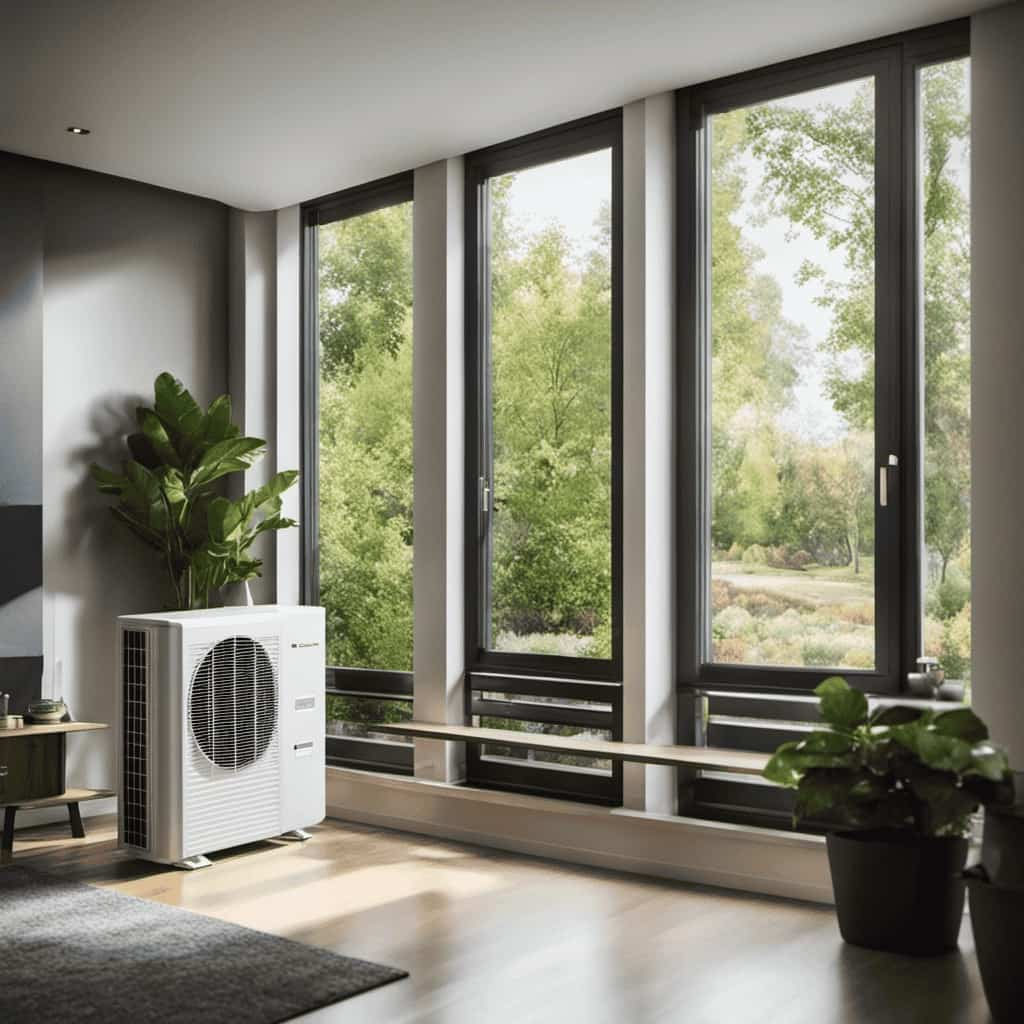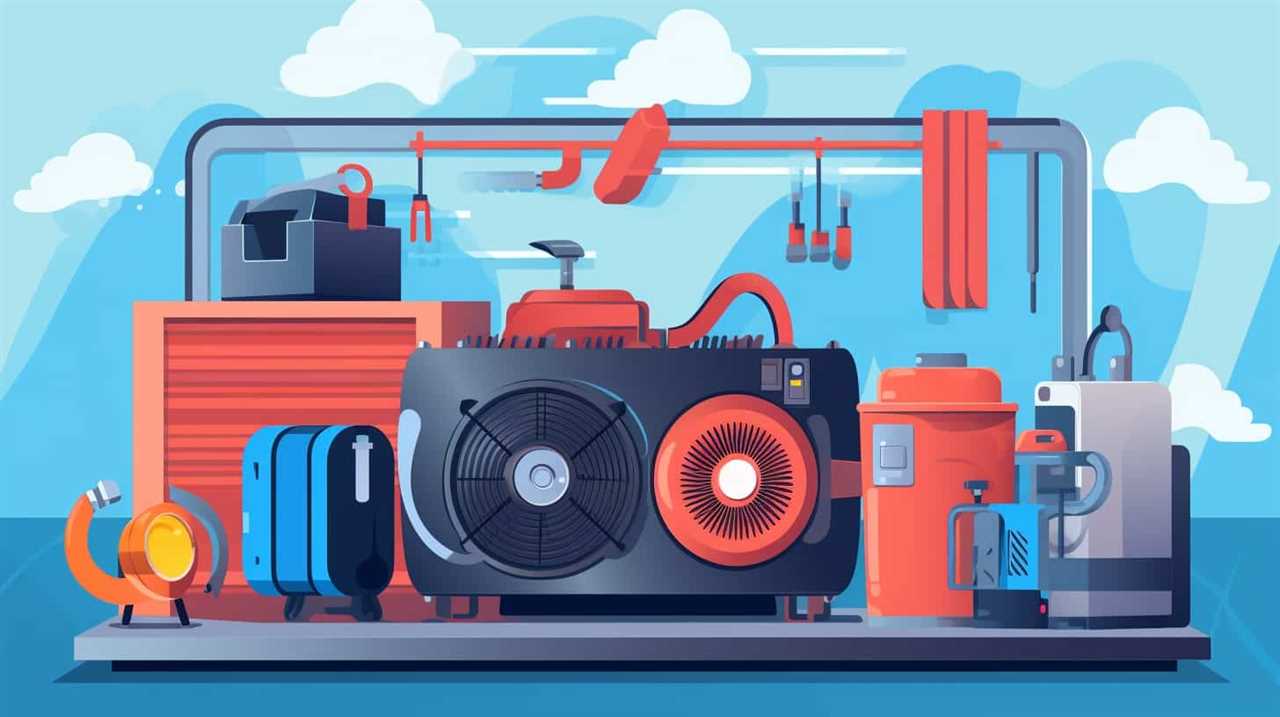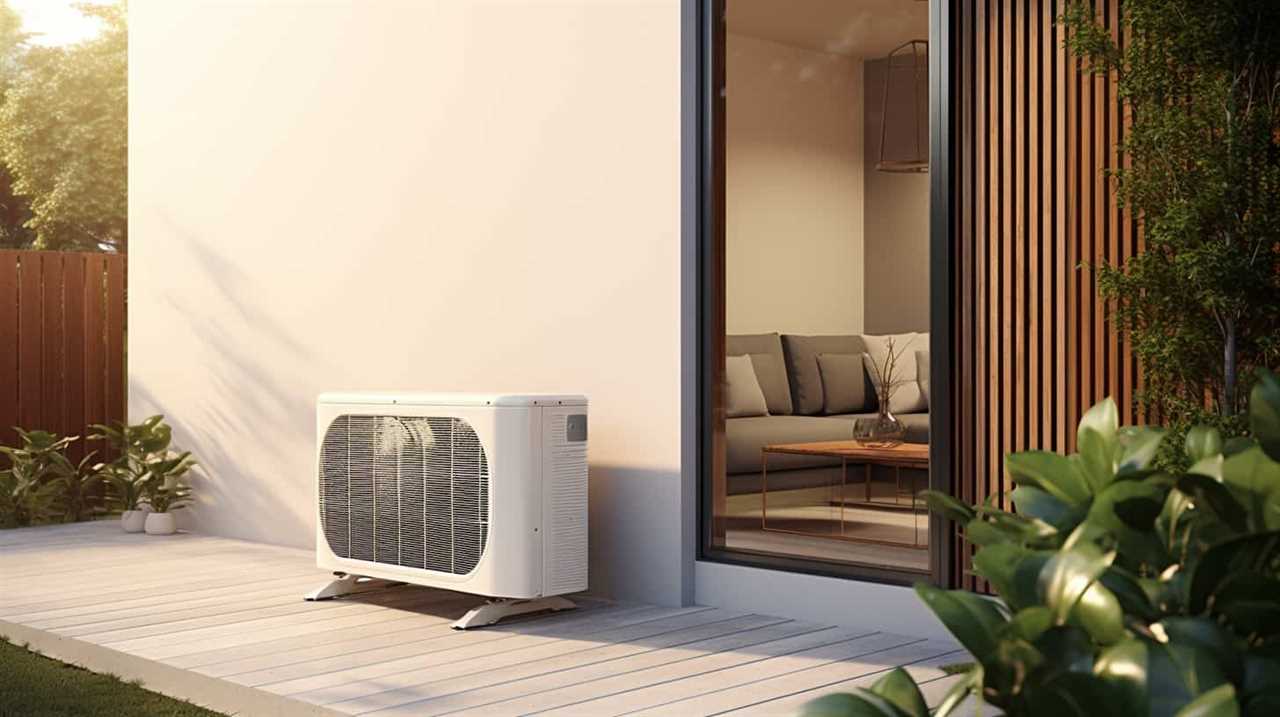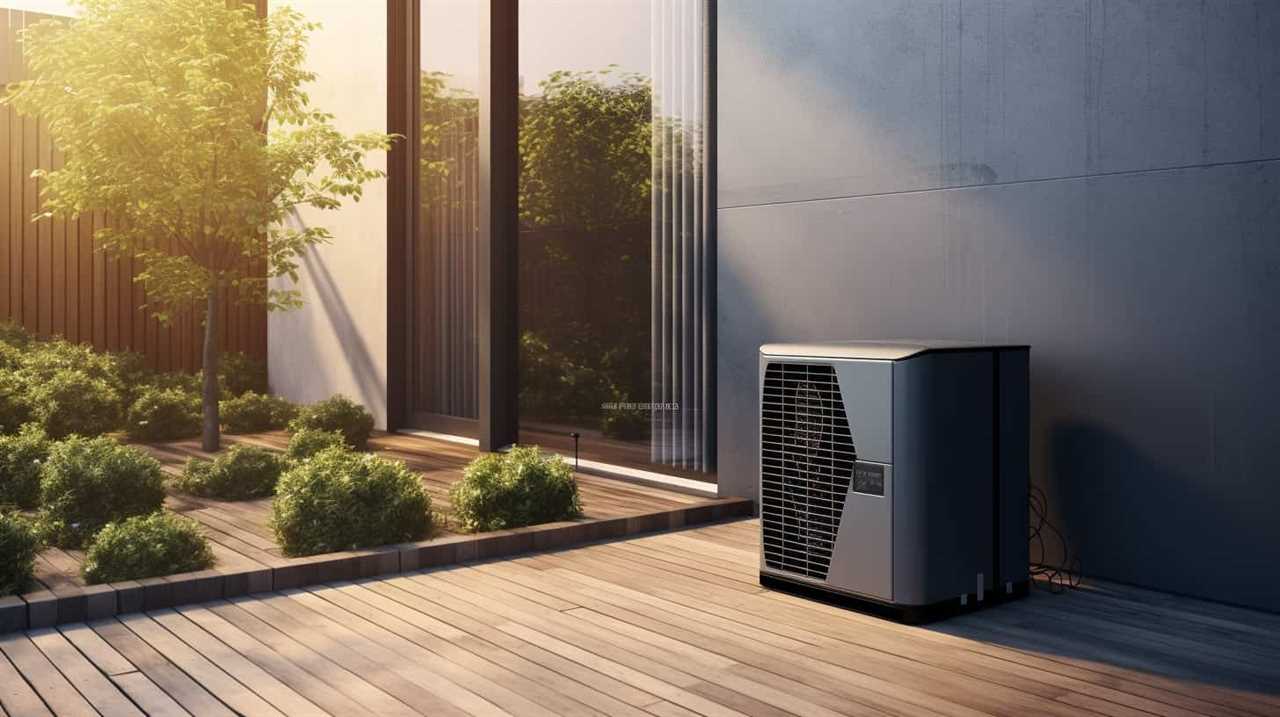Are you ready to test your knowledge on the energy efficiency of heat pumps?
In this quiz, we’ll evaluate your mastery of the subject, helping you gauge just how well you understand the ins and outs of thermal energy transfer, efficiency ratings, and the factors that impact energy efficiency.
So grab a pen and paper, because it’s time to see just how skilled you are in optimizing the performance of your heat pump.
Let’s dive in!

Key Takeaways
- Heat pumps rely on the transfer of thermal energy through refrigerants, and their efficiency is measured by the Coefficient of Performance (COP).
- Factors such as proper sizing, installation, and maintenance, as well as climate conditions and usage patterns, can affect the efficiency of heat pumps.
- Comparing SEER and HSPF ratings helps determine the energy efficiency of heat pumps.
- Regular maintenance, cleaning, and optimizing temperature settings are essential for maximizing heat pump performance and efficiency.
The Basics of Thermal Energy Transfer in Heat Pumps
We all know that heat pumps rely on the transfer of thermal energy to operate efficiently. Understanding the principles of thermal energy transfer is crucial to comprehending how heat pumps work.
Heat pump operation principles are founded on the fundamental concept of moving thermal energy from one place to another. This process is achieved through the use of refrigerants, which absorb and release heat as they undergo phase changes.
When the refrigerant evaporates, it absorbs thermal energy from the surroundings, cooling them down. Conversely, when the refrigerant condenses, it releases thermal energy, heating up the surroundings.
By manipulating the refrigerant’s pressure and temperature, heat pumps can transfer thermal energy from a low-temperature source to a higher temperature sink. This process allows heat pumps to provide heating or cooling, depending on the desired outcome.

Understanding these thermal energy transfer principles is essential for optimizing heat pump efficiency and providing effective service to those seeking comfort in their homes or businesses.
Understanding the Efficiency Rating of Heat Pumps
Let’s begin by discussing the efficiency rating of heat pumps.
The efficiency rating is a measure of how effectively a heat pump converts energy input into useful heating or cooling output.
Several factors can affect the efficiency of a heat pump, including the design, size, and installation of the system, as well as the operating conditions.

It’s important to understand the efficiency rating and consider it when comparing different heat pump options to make an informed decision about energy-saving options.
Efficiency Rating Explained
The efficiency rating of heat pumps provides a measure of their energy performance. It’s an important factor to consider when choosing a heat pump, as it directly affects its operating costs and environmental impact.
Heat pumps are designed to transfer heat from one location to another, using a small amount of electricity to move thermal energy from a cooler space to a warmer space. The efficiency rating is typically expressed as a Coefficient of Performance (COP), which is the ratio of heat output to electricity input. A higher COP indicates a more efficient heat pump.
Additionally, advancements in technology have allowed for the integration of thermostat programming and renewable energy sources, further enhancing the overall energy efficiency of heat pumps. By understanding and utilizing these features, homeowners can maximize the energy savings and reduce their carbon footprint.

Factors Affecting Efficiency
Factors affecting the efficiency of heat pumps include the size and design of the unit, proper installation and maintenance, climate conditions, and usage patterns. Let’s delve into each factor to understand their influence on performance and impact on electricity consumption.
-
Size and design of the unit: The size of a heat pump should be carefully matched to the heating and cooling demands of the space it serves. An undersized unit may struggle to maintain desired temperatures, leading to increased energy consumption, while an oversized unit may short-cycle, resulting in poor efficiency and increased wear and tear.
-
Proper installation and maintenance: A correctly installed and well-maintained heat pump ensures optimal performance. Improper installation can lead to air leaks, refrigerant issues, or inadequate airflow, all of which negatively affect efficiency. Regular maintenance, including cleaning filters, checking refrigerant levels, and inspecting electrical connections, helps keep the system running efficiently.
-
Climate conditions and usage patterns: The climate in which the heat pump operates plays a significant role in its efficiency. Extreme temperatures, such as very cold winters or hot summers, can strain the system and reduce its efficiency. Additionally, usage patterns, such as setting the temperature too high or low, can impact electricity consumption.

Understanding these factors and addressing them appropriately can help maximize the efficiency of heat pumps, resulting in energy savings and enhanced comfort.
Comparing Energy-Saving Options
We can compare energy-saving options by understanding the efficiency rating of heat pumps. When it comes to energy-saving technology, heat pumps are one of the most popular choices. These appliances are designed to transfer heat from one place to another, providing both heating and cooling functions.
The efficiency of a heat pump is measured using the Seasonal Energy Efficiency Ratio (SEER) and Heating Seasonal Performance Factor (HSPF) ratings. The SEER rating measures the cooling efficiency of the heat pump, while the HSPF rating measures its heating efficiency. By comparing the SEER and HSPF ratings of different heat pumps, we can determine which ones are more energy efficient.
This information is crucial for individuals who desire energy-efficient appliances that can help them save on their energy bills while also reducing their environmental impact.

Factors Affecting the Energy Efficiency of Heat Pumps
As we delve into the factors that impact the energy efficiency of heat pumps, it’s important to consider various aspects such as installation quality, insulation levels, and maintenance practices. These factors play a crucial role in determining the overall efficiency and performance of heat pumps.
-
Installation Quality: A well-executed installation ensures proper sizing, placement, and connection of the heat pump, resulting in optimal performance and energy savings.
-
Insulation Levels: Adequate insulation prevents heat loss or gain through walls, floors, and ceilings. Proper insulation minimizes the workload on the heat pump, leading to improved energy efficiency.
-
Maintenance Practices: Regular maintenance, including cleaning or replacing filters, lubricating moving parts, and inspecting electrical connections, ensures the heat pump operates at its peak efficiency.

Considering these factors is essential to maximize energy savings and minimize the environmental impact of heat pump systems.
Now, let’s move on to exploring how we can measure and compare heat pump efficiency.
How to Measure and Compare Heat Pump Efficiency
Our main goal is to accurately measure and compare heat pump efficiency in order to make informed decisions about energy consumption and cost savings.
When it comes to measuring efficiency accurately, it’s important to consider the coefficient of performance (COP) and the seasonal energy efficiency ratio (SEER). COP measures the ratio of heat output to electrical input, while SEER calculates the cooling output during a typical cooling season divided by the total electrical energy input.

By comparing the COP and SEER ratings of different heat pumps, we can determine which models are more energy efficient.
It’s also essential to incorporate energy saving practices such as proper installation, regular maintenance, and optimizing the heat pump’s settings.
Tips for Improving the Energy Efficiency of Your Heat Pump
To enhance the energy efficiency of our heat pump, we can implement various strategies that focus on optimizing its performance and reducing energy consumption. Here are three tips to improve the efficiency of your heat pump:
-
Invest in energy efficient models: When purchasing a heat pump, choose a model that has a high Seasonal Energy Efficiency Ratio (SEER) and Heating Seasonal Performance Factor (HSPF) ratings. These ratings indicate the efficiency of the heat pump in cooling and heating modes respectively.

-
Use programmable thermostats: Programmable thermostats allow you to set different temperature schedules for different times of the day. By programming your heat pump to operate at lower temperatures when you’re away or asleep, you can minimize energy wastage and reduce your heating and cooling costs.
-
Regularly maintain and clean your heat pump: Dirty filters, clogged coils, and blocked vents can hinder the performance of your heat pump and decrease its efficiency. Regular maintenance, such as cleaning or replacing filters and clearing debris around the unit, can help optimize its efficiency.
By implementing these strategies, you can maximize the energy efficiency of your heat pump and reduce your environmental impact.
Now, let’s explore the common challenges in maximizing heat pump energy efficiency.

Common Challenges in Maximizing Heat Pump Energy Efficiency
One of the most common challenges in maximizing heat pump energy efficiency is ensuring proper insulation throughout our home. Heat pump maintenance and energy-saving techniques can be rendered ineffective if our homes aren’t properly insulated.
Inadequate insulation can result in heat loss or gain, causing our heat pumps to work harder and consume more energy to maintain the desired temperature. To overcome this challenge, it’s essential to assess the insulation in our homes and identify areas that require improvement.
This may involve sealing air leaks, adding insulation to walls and attics, and ensuring proper insulation around windows and doors. Regular maintenance of our heat pumps, including cleaning or replacing filters, lubricating moving parts, and checking refrigerant levels, is also crucial in maximizing energy efficiency.
The Role of Maintenance in Heat Pump Energy Efficiency
Regular maintenance plays a vital role in maximizing heat pump energy efficiency. Whether performed by a professional or done as a DIY project, proper maintenance ensures that the heat pump operates at its optimal level.

Here are three key aspects of maintenance that contribute to energy efficiency:
-
Filter cleaning and replacement: Dirty filters restrict airflow and force the heat pump to work harder, resulting in decreased efficiency. Regularly cleaning or replacing filters allows for proper airflow and improved energy efficiency.
-
Coil cleaning: Over time, the coils of the heat pump can accumulate dirt and debris, which hinders heat transfer. Cleaning the coils helps maintain their efficiency and ensures optimal heat transfer.
-
Lubrication of moving parts: The smooth operation of the heat pump’s moving parts is crucial for energy efficiency. Regular lubrication minimizes friction, reducing energy consumption and extending the lifespan of the equipment.

Energy-Saving Strategies for Optimal Heat Pump Performance
When it comes to optimizing the performance of your heat pump, there are several energy-saving strategies to consider.
First, adjusting your thermostat settings for efficiency can make a significant impact on energy consumption.
Regular maintenance and cleaning of your heat pump system is also crucial to ensure optimal performance.
Lastly, don’t forget about insulation and sealing tips to minimize energy loss and maximize efficiency.

Thermostat Settings for Efficiency
We can optimize our heat pump’s performance and save energy by adjusting the thermostat settings for efficiency. Here are three key ways to achieve this:
-
Utilize the benefits of a smart thermostat: Investing in a smart thermostat offers several advantages. These devices can learn your schedule, adapting the temperature settings accordingly. Additionally, they can be controlled remotely through a smartphone app, allowing you to make adjustments even when you’re away from home.
-
Take advantage of programmable thermostat features: Programmable thermostats allow you to set different temperature schedules for different times of the day. This means you can lower the temperature when you’re not at home and raise it before you return. This feature ensures that your heat pump isn’t working harder than necessary, resulting in energy savings.
-
Optimize temperature settings for efficiency: Set your thermostat to the highest comfortable temperature during the summer and the lowest comfortable temperature during the winter. This helps reduce the workload on your heat pump, resulting in increased energy efficiency.

Regular Maintenance and Cleaning
To ensure optimal heat pump performance and energy efficiency, it’s important that we regularly maintain and clean our heat pumps.
Regular maintenance involves inspecting and cleaning the filters, coils, and fins to remove any dirt or debris that may hinder airflow. This helps the heat pump operate efficiently and prevents any potential damage.
Cleaning the filters every one to three months and scheduling a professional cleaning annually is recommended.
Troubleshooting is also an essential part of regular maintenance. It involves checking for any unusual noises, leaks, or performance issues and addressing them promptly.

Insulation and Sealing Tips
And, by properly insulating and sealing our homes, we can significantly improve the energy efficiency and performance of our heat pumps. Here are three key insulation techniques and air leakage prevention strategies that can help optimize the performance of our heat pump systems:
-
Seal air leaks: Identify and seal any gaps, cracks, or openings where air can escape or enter the home. This can be done using caulking, weatherstripping, or expanding foam.
-
Insulate walls and ceilings: Adding insulation to the walls and ceilings helps to minimize heat transfer, keeping the indoor environment at a consistent temperature. Insulation materials such as fiberglass, cellulose, or spray foam can be used for this purpose.
-
Insulate ductwork: Insulating the ductwork helps to prevent heat loss or gain during the distribution of air. Insulating ducts with materials like foil-faced fiberglass or foam insulation sleeves can improve the overall efficiency of the heat pump system.

By implementing these insulation and sealing techniques, we can ensure that our heat pumps operate at their maximum potential.
Now, let’s move on to evaluating our knowledge and skills in heat pump energy efficiency.
Evaluating Your Knowledge and Skills in Heat Pump Energy Efficiency
Let’s assess our understanding and abilities in heat pump energy efficiency. Evaluating our skills in this area is crucial to identify areas of improvement and enhance our energy-saving techniques. To help with this evaluation, let’s consider the following three aspects of heat pump energy efficiency:
| Aspects of Heat Pump Energy Efficiency | Description |
|---|---|
| System knowledge | Assessing our knowledge of heat pump systems, including their components, operation, and maintenance requirements. |
| Energy-saving practices | Evaluating our proficiency in implementing energy-saving techniques such as proper thermostat settings, regular filter cleaning, and utilizing programmable thermostats. |
| Efficiency optimization | Analyzing our ability to optimize heat pump efficiency through proper insulation, sealing air leaks, and regular system inspections and tune-ups. |
Frequently Asked Questions
How Much Does a Heat Pump Cost to Install?
The cost of heat pump installation depends on various factors such as the size of the unit, the type of pump, and the complexity of the installation process. Several variables affect the final price.

Can a Heat Pump Be Used to Heat a Swimming Pool?
Using a heat pump for pool heating has its pros and cons. It can provide energy savings, but its efficiency depends on various factors. Overall, it’s an option worth considering for those looking to reduce their pool heating costs.
What Is the Average Lifespan of a Heat Pump?
The average lifespan of a heat pump depends on its maintenance requirements. Regular upkeep and servicing can prolong its lifespan, ensuring efficient performance and energy savings.
Are There Any Government Incentives or Rebates Available for Purchasing a Heat Pump?
There are government incentives and rebates available for purchasing a heat pump. These incentives can help offset the cost of installation and encourage energy efficiency, providing long-term benefits for both homeowners and the environment.
Can a Heat Pump Be Used in a Cold Climate?
In cold climates, heat pump efficiency may be affected due to the lower outdoor temperatures. However, there are benefits to using heat pumps in these areas, such as lower operating costs and reduced carbon emissions. Drawbacks include decreased heating capacity in extreme cold.

Conclusion
In conclusion, by understanding the basics of thermal energy transfer and the efficiency rating of heat pumps, we can better measure and compare their efficiency.
Implementing energy-saving strategies and regular maintenance can further optimize heat pump performance.
However, it’s crucial to continuously improve our knowledge and skills in heat pump energy efficiency to combat common challenges.
Let’s strive for mastery in this field to revolutionize energy conservation and make a significant impact on our planet’s future!










